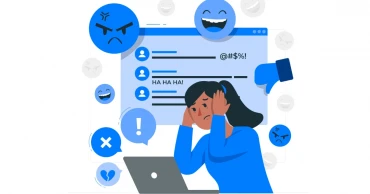Cyber Security Act 2023
Cyberbullying: What to Do If Someone is Harassing You Online
Cyberbullying has emerged as a widespread concern in the contemporary digital era, as harassment across diverse online platforms has become increasingly frequent. This type of bullying poses significant threats to the mental health and overall well-being of individuals. This underscores the importance of addressing this issue promptly and effectively.
What is Cyberbullying or Cyber Harassment?
Cyberbullying, also known as cyber harassment, refers to the use of digital communication tools such as social media platforms, messaging apps, or online forums to intimidate, threaten, or harass individuals. This form of bullying encompasses various actions, including sending hurtful messages, spreading rumours, sharing embarrassing photos or videos without consent, and creating fake accounts to impersonate and harass someone.
Cyberbullying can occur anonymously, making it difficult to identify perpetrators. Also, it can have profound and lasting effects on the mental and emotional well-being of victims.
Read more: '80% of cyberbullying victims are women'
Types of Cyberbullying
Harassment
Harassment entails sending mean or threatening messages to someone online. It can be done through text messages, emails, social media posts, or online chat rooms.
Exclusion
Exclusion involves intentionally leaving someone out of an online group or activity. For instance, a cyberbully might create a social media group and exclude their target.
Outing and Doxxing
Doxxing includes sharing someone's private information online without their consent. For example, their home address, phone number, or embarrassing photos.
Read more: Online bullying serious problem for 85% of Bangladesh youths: Survey
Impersonation
Impersonation means creating a fake online profile and pretending to be someone else. The cyberbully can then use this fake profile to send mean messages or damage the victim's reputation.
Trickery
Trickery mainly is deceiving someone into sharing personal information or embarrassing photos. For example, a cyberbully might create a fake survey to obtain personal details.
Cyberstalking
This involves using technology to harass, intimidate, or threaten someone. This includes sending threatening messages or tracking the victim's online activity.
Read more: Why are Suicide Rates Higher Among Men?
Flaming
Flaming is described as posting angry or insulting messages on someone's social media page or online forum.
Trolling
Trolling entails posting inflammatory or off-topic messages in an online forum to upset other users.
Fraping
A frape happens when someone changes another person’s information on social media without them knowing or giving permission.
Read more: How to Protect Your Child from Sexual Abuse?
Impacts of Cyber Harassment
Emotional Distress
Cyberbullying can lead to profound emotional turmoil, including feelings of sadness, humiliation, and anger. Victims often experience heightened anxiety, constantly anticipating the next hurtful encounter, which undermines their sense of safety and well-being.
Psychological Effects
Research shows a significant correlation between cyberbullying and psychological challenges. Victims of cyberbullying frequently endure elevated levels of stress, anxiety, depression, and even suicidal ideation.
The relentless influx of derogatory messages and harassment often fosters sentiments of powerlessness and diminished self-worth. Also, the incessant negativity and pressure can prove overwhelming for those targeted.
Read more: Students with Depression: Tips for Parents and Educators
Social Isolation and Self-Esteem Damage
Cyberbullying can cause individuals to retreat from both online and offline social interactions, fearing additional harassment or scrutiny from their peers. This can foster feelings of isolation and solitude. Additionally, cyberbullying can profoundly impact an individual's self-esteem, as the recurrent attacks can engender feelings of worthlessness and insecurity.
Academic Consequences
The emotional distress caused by cyberbullying can impact victims' ability to concentrate on their studies and perform academically. Consequently, this can lead to a decline in grades and overall academic performance of the bullied person.
Physical Health Issues
The prolonged stress and anxiety caused by cyberbullying can manifest in physical health problems such as headaches, insomnia, and gastrointestinal issues. Victims may also experience changes in appetite and energy levels.
Read more: Digital Detox: Unplugging for Stress Relief and Mental Wellbeing
Long-term Effects
The effects of cyberbullying can extend beyond the immediate harassment, affecting victims' long-term mental health and well-being. Some individuals may carry the trauma of cyberbullying into adulthood, impacting their relationships and overall quality of life.
Bystander Effects
Observing cyberbullying can exacerbate mental health issues and foster an atmosphere of apprehension and vulnerability. It can instil fear of becoming a target, erode trust in online interactions and impact individuals' well-being.
What to do If You Experience Cyberbullying in Bangladesh
Stay Calm
It is essential to maintain composure and refrain from impulsive reactions to harassment. Responding to the bully may exacerbate the situation, as it gratifies their desire for a reaction. So, try to resist the temptation to engage with their messages or posts.
Read more: Helicopter Parenting: Signs, Pros, Cons and How to Change
Document Evidence
It is important to document instances of cyberbullying, whether through screenshots of messages or posts or by noting down dates and times. This evidence will prove invaluable should you need to report the bullying at a later stage.
Reach Out for Support
It is highly recommended to discuss your experiences with a reliable friend, family member, another trusted adult, or mental health professional. They can provide valuable support and advice on navigating through the situation effectively.
Block the Bully
You may utilise privacy settings to block the person responsible for the harassment from reaching out to you further. Most social media platforms and messaging apps offer the option to block individuals. It can effectively prevent any further contact with them.
Read more: Workplace stress affecting women in Bangladesh needs attention
Report the Abuse to the Platform
Utilising the available reporting tools to report instances of cyberbullying is crucial. Most social media platforms and online forums provide mechanisms for reporting abusive behaviour. Report the cyberbullying to the relevant website or platform, as they typically have anti-bullying policies and may take disciplinary action against the perpetrator, such as suspending their account.
Seek Legal Advice
In instances of severe cyberbullying, it is advisable to seek advice from a legal professional. The available remedies for cyberbullying may vary depending on individual circumstances. Victims are advised to seek legal counsel from a lawyer knowledgeable about cyberbullying and relevant laws for guidance.
File a Report
Victims of cyberbullying have the option to file a criminal complaint with the police under the Cyber Security Act of 2023. This act criminalises cyberbullying and imposes imprisonment and/or fines on offenders found guilty.
Read more: Parliament passes Cyber Security Bill 2023
Cyber Crime Help Desk
Bangladesh Police operates a Cyber Crime Help Desk for women (https://www.police.gov.bd/en/police_cyber_support_for_women) where victims can report incidents of cyberbullying and seek assistance. Evidence and proof (links, screenshots, etc) of cyberbullying can be forwarded via email to [email protected]
Also, victims can lodge complaints through multiple channels, including the dedicated hotlines at the Police Headquarters, the nearest police station or the official Facebook page of "Cyber Police Centre, CID, Bangladesh Police."
Alternative Reporting
Cybercrime victims also have the option to file complaints with the Bangladesh Telecommunication Regulatory Commission (BTRC) by calling their hotlines or emailing [email protected].
Read more: Sibling Bullying and Abuse: Reasons, Types, Signs and Prevention
BTRC pledges to take action within 24 hours, with perpetrators brought to justice within 3 days of filing the complaint. The government has also introduced a cyber-crime helpline at +88-02-55007183 for victims to report their complaints.
Consider Civil Suit
Victims can pursue a civil suit for damages against the perpetrator, seeking compensation for emotional distress and reputation damage caused by cyberbullying. In cases of criminal intimidation, the perpetrator may be liable under the Penal Code 1860.
Seek Restraining Orders
Although the term "restraining order" is not specifically defined in Bangladesh’s law, victims can apply under relevant sections before a competent executive magistrate to prohibit a perpetrator from making unlawful contact.
Read more: Should You See a Therapist? 8 Surefire Signs You Need Help
Take Care of Yourself
The emotional strain of cyberbullying can impact your mental well-being. You should prioritise self-care by reaching out to loved ones, participating in activities that bring you joy, and seeking professional assistance if necessary. Concentrate on self-nurturing activities to alleviate stress during this demanding period.
Verdict
Cyber harassment is a serious issue that can have profound consequences on individuals' lives. It is crucial to recognise the signs of cyberbullying, take proactive measures to protect oneself and seek support if victimised. By working together to combat cyberbullying, we can create safer and more inclusive online communities.
Read more: Bullying in School: How to Protect Children and Deal with the Issue
1 year ago
US encourages Bangladesh govt to enable stakeholders to review the draft Cyber Security Act
The United States has welcomed the Bangladesh government's decision to reform the Digital Security Act.
“We welcome the Bangladesh government’s long-stated commitment to reform the law, to protect freedom of expression,” US State Department Spokesperson Matthew Miller told reporters at a regular briefing in Washington on August 7.
Read: Cyber Security Act could be deadlier than DSA: Rizvi
He said the US encourages the government of Bangladesh to give all stakeholders an opportunity to review and provide input on the new draft Cyber Security Act, to ensure that it meets international standards.
“As we’ve previously stated, the Digital Security Act has been used to arrest, detain, and silence critics,” the US State Department spokesperson said.
Read: TIB guardedly welcomes Cabinet’s decision to scrap DSA
2 years ago
Imprisonment goes, fines to be main punishment for defamation: Law Minister
The Cabinet on Monday approved in principle the draft of Cyber Security Act 2023 with the provisions of maximum Tk 25 lakh in fine for publishing defamatory information through digital media, said Law, Justice and Parliamentary Affairs Minister Anisul Huq.
“There will be no provision of jail sentence and the government will impose fine after abolishing the jail term in the Act,” he told reporters after the Cabinet meeting at the Secretariat.
He said that related provisions for cyber security included in the Digital Security Act will be retained in the Act without making any changes.
Law minister questions citizenship of those who defy constitution
According to the Section 29 of the Digital Security Act, if any person publishes or transmits any defamatory information as described in section 499 of the Penal Code through Website or in any other electronic format, he shall be punished with imprisonment for a term not exceeding 3 (three) years, or with fine of Tk 5 lakh.
As per the Cyber Security Act-2023, the government has planned to scrap jail terms and impose fines in this section, he said.
“From now on the only punishment is fine in this section. But if anyone fails to pay the fine he would have to serve in jail for three-six months.”
No dialogue with BNP over unrealistic proposals: Law Minister
Earlier on Monday, the Cabinet decided to replace the Digital Security Act with the Cyber Security Act 2023, in which sections of the existing law will be amended. Prime Minister Sheikh Hasina chaired the meeting in the morning.
The name of the law has been changed, and some sections of the law have been amended, the minister added.
On May 3, the law minister said that the Digital Security Act will not be repealed but necessary amendments will be made.
Govt has plans to modernise Air Force, Navy: Law Minister
The DSA was enacted on October 8, 2018 with the aim of preventing the spread of sectarianism, extremism, terrorist propaganda, and hatred against religious or ethnic minorities through social media, print media or any other electronic media.
But, since its inception, the DSA has been criticized heavily for its widespread misuse, especially against journalists.
2 years ago
Digital Security Act to be replaced by Cyber Security Act 2023
The government of Bangladesh has decided to replace the Digital Security Act with Cyber Security Act 2023, in which sections of the existing law will be amended.
Law, Justice, and Parliamentary Affairs Minister Anisul Huq confirmed the development today (August 07, 2023).
Read: ARTICLE 19 concerned by DSA case against RTV reporter
The decision came after a meeting of the Cabinet Division chaired by Prime Minister Sheikh Hasina this morning, he added.
The cabinet approved the draft in principle, the law minister said.
The name of the law has been changed, and some sections of the law have been amended, the minister added.
Read more: Digital Security Act to be amended: Law Minister
The minister further said that after the amendment, there will no longer be any provision for jail term; only the provision of fines will be kept.
Prime Minister Sheikh Hasina's government is working for the people, he said, adding, "We have taken measures to stop the misuse and abuse of DSA through some amendments."
Earlier on May 3, Anisul Huq said that Digital Security Act will not be repealed but necessary amendments will be made.
The DSA was enacted on October 8, 2018 with the aim of preventing the spread of sectarianism, extremism, terrorist propaganda, and hatred against religious or ethnic minorities through social media, print media or any other electronic media.
However, since its inception, DSA was criticized heavily for its misuse.
2 years ago







